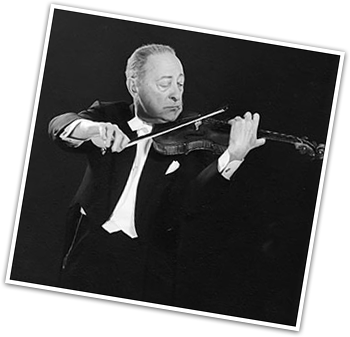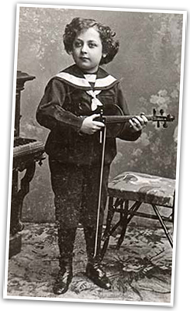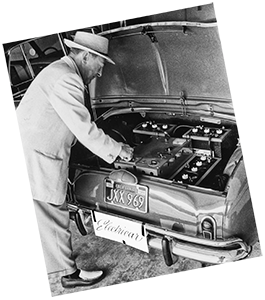Quotations
Throughout his career, Jascha Heifetz was known for many wise, amusing, and occasionally perplexing statements that were reported in the press, or shared with family members, audiences, and students.
Here are some of the most memorable ones.
There is no such thing as perfection. You establish a standard and then you find out it is never good enough. When I play a piece well, I always hope that I’ll play it better tomorrow.
Stopped on the streets of Manhattan and asked how to get to Carnegie Hall, Heifetz is reported to have replied: “Practice, practice, practice.”
The discipline of practice every day is essential. When I skip a day, I notice a difference in my playing. After two days, the critics notice, and after three days, so does the audience.
Criticism does not disturb me, for I am my own severest critic. Always in my playing I strive to surpass myself, and it is this constant struggle that makes music fascinating to me.
Instinctively we recognize good music, and somehow or other, we know the real thing. When I have played in country schools where the children had never heard a flesh-and-blood musician in their lives, they listened attentively when I played first-rate pieces. When I played second-rate pieces – as an experiment only – they wriggled and stared out the window.
We continue learning every day of our life. But for some of us, too much formal education can result in getting nowhere by degrees.
You must preserve your enthusiasm for playing. Loss of that enthusiasm is deadly to musicianship.
Guide a youngster’s fingers over a piano keyboard, and let him pick out Yankee Doodle. From that moment onward, he will have a heightened appreciation of music.
You always hear of the “delicate, sensitive artist.” I assure you that it takes the nerves of a bullfighter, the digestion of a peasant, the vitality of a nightclub hostess, the tact of a diplomat, and the concentration of a Tibetan monk to lead the strenuous life of a virtuoso. The great compensation, of course, is the human one. In the course of giving concerts, I have been around the world many times. I know literally thousands of people in all parts of the globe. I don’t suppose there’s a place in the world where I haven’t friends. If that’s not a reward for service, what is?
We do not need to be educated musically. We simply need to guard against musical miseducation. Our own ears, unless they have grown so used to mediocrity that they have lost their keenness, will do the rest of the job for us.







